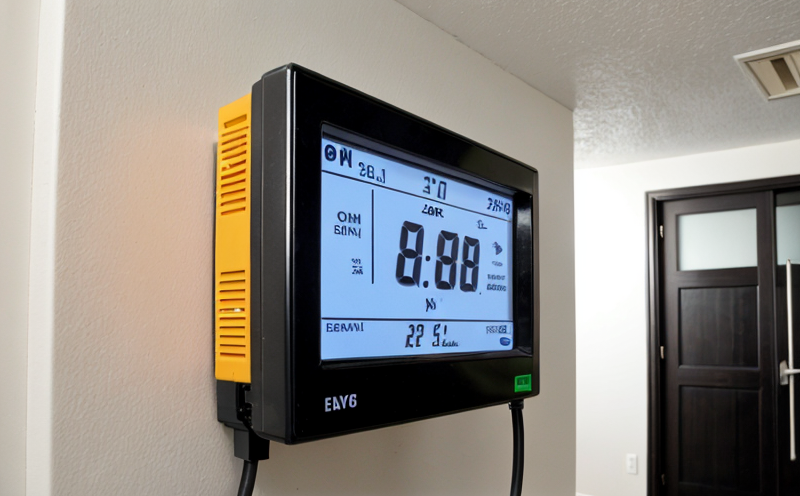IEC 62623 Energy Efficiency Testing of Office Equipment
The IEC (International Electrotechnical Commission) standard 62623-1:2013 sets the framework for testing and certification of energy efficiency in office equipment. This service ensures that manufacturers meet stringent international requirements, contributing to sustainable practices and reducing operational costs.
The IEC 62623 series covers a range of aspects related to energy efficiency, including power consumption under different operating conditions, standby mode, and idle power levels. For office equipment such as printers, copiers, and multifunction devices (MFDs), this testing is crucial in ensuring compliance with global standards that promote energy conservation.
Office equipment often operates in a variety of environments—ranging from high-density offices to home-based setups—and the standard takes these conditions into account. For instance, it considers power consumption during different modes of operation such as active printing, scanning, copying, and standby mode. The testing also evaluates the impact of different environmental factors like temperature, humidity, and voltage fluctuations on energy efficiency.
The IEC 62623-1:2013 standard defines detailed methodologies for measuring power consumption in office devices under various conditions, including:
- Active Mode: Power consumed during active use of the device.
- Standby Mode: Power used when the device is not performing any task but still connected to a power source.
- Idle Mode: Power used while the device is in standby mode with no specific task being performed.
- Voltage Variations: Testing under different voltage conditions to ensure robust performance across various geographical regions.
- Environmental Conditions: Evaluating how power consumption varies with changes in temperature and humidity levels.
The standard also provides a framework for calculating the energy efficiency index (EEI) of office equipment. EEI is a key parameter that helps users understand the energy consumption of their devices over time, aiding in decision-making processes related to procurement and sustainability efforts.
By adhering to IEC 62623-1:2013, manufacturers can ensure that their products are not only compliant but also competitive in the global market. The certification process involves rigorous testing protocols that simulate real-world usage scenarios, ensuring that the equipment performs efficiently under various conditions.
Compliance with this standard is crucial for several reasons:
- Regulatory Requirements: Many countries mandate compliance with IEC standards to ensure energy efficiency and environmental protection.
- Sustainability Goals: By reducing power consumption, manufacturers can contribute significantly to global sustainability efforts.
- Customer Satisfaction: Efficient devices translate into lower operational costs for end-users, leading to higher customer satisfaction.
- Market Differentiation: Meeting or exceeding standards can set products apart in competitive markets.
In summary, IEC 62623-1:2013 is a comprehensive standard that covers the testing and certification of energy efficiency for office equipment. This service ensures that manufacturers meet stringent international requirements, contributing to sustainable practices and reducing operational costs.
Benefits
- Regulatory Compliance: Ensures compliance with international standards, reducing legal risks and penalties.
- Sustainability: Promotes energy-efficient products that contribute to global sustainability efforts.
- Market Differentiation: Helps manufacturers differentiate their products in competitive markets by meeting or exceeding standards.
- Customer Satisfaction: Efficient devices translate into lower operational costs for end-users, leading to higher customer satisfaction.
- Economic Benefits: Reduces long-term energy costs and improves profitability for businesses using the tested equipment.
- Social Responsibility: Demonstrates a commitment to environmental responsibility and social welfare.
Eurolab Advantages
Eurolab offers unparalleled expertise in IEC 62623-1:2013 testing, with a team of highly skilled professionals dedicated to ensuring compliance. Our state-of-the-art facilities and advanced instrumentation provide accurate and reliable test results that meet the highest international standards.
Our services extend beyond simple testing; we also offer comprehensive support for manufacturers throughout the certification process, from initial consultation to final approval. This includes guidance on specimen preparation, detailed reports tailored to specific needs, and continuous support in meeting regulatory requirements.
Eurolab’s commitment to quality is reflected in our unwavering adherence to international standards such as IEC 62623-1:2013. We ensure that all testing procedures are carried out in accordance with these guidelines, providing manufacturers with peace of mind and confidence in the reliability and accuracy of our results.
Our team is dedicated to supporting quality managers, compliance officers, R&D engineers, and procurement professionals in achieving their goals. With Eurolab’s expertise, you can be assured that your office equipment will meet stringent energy efficiency requirements, contributing to both sustainability and profitability.
Customer Impact and Satisfaction
Eurolab's comprehensive testing services for IEC 62623-1:2013 have a significant impact on our customers. By ensuring compliance with international standards, we help manufacturers meet regulatory requirements, enhance product quality, and improve customer satisfaction.
Our customers benefit from the following:
- Regulatory Compliance: Ensures that products are legally compliant in various jurisdictions.
- Market Access: Facilitates easier entry into global markets by meeting international standards.
- Increased Sales: Competitive edge and higher demand due to superior product performance and reliability.
- Enhanced Reputation: Establishes a reputation for quality and reliability, enhancing brand image.
- Sustainable Practices: Promotes environmentally friendly products that align with sustainability goals.
- Cost Savings: Reduced long-term energy costs and improved operational efficiency.
In conclusion, Eurolab's IEC 62623-1:2013 testing services play a crucial role in supporting our customers' success by ensuring compliance with international standards. Our commitment to quality and expertise ensures that manufacturers can confidently meet regulatory requirements and contribute to global sustainability efforts.





